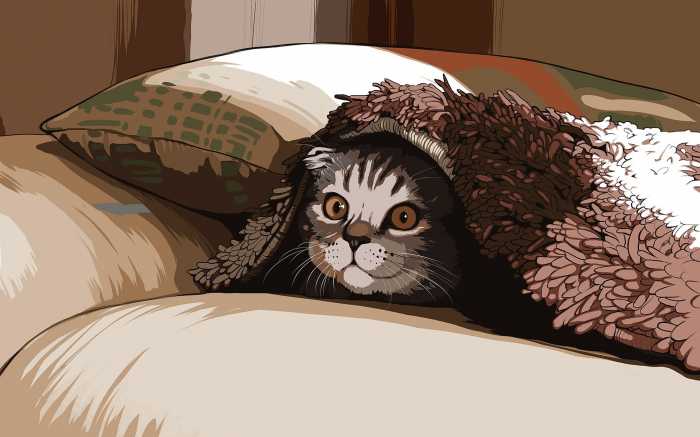
Cattime - 9 Ways To Manage Your Cat’s Separation Anxiety While You’re Away Traveling
Posted on 2 November, 2022

Image by freeillustrated from Pixabay
Written by Mike Clark for Cattime
It’s a myth that all cats are totally independent. Sure, many of our feline friends are perfectly capable of being on their own for long periods of time. But other cats have separation anxiety that can lead to behaviours like excessive meowing, compulsive grooming, loss of appetite, vomiting, and eliminating outside of the litter box.
This can especially be a problem when you’re traveling for a long period of time. But there are steps you can take to calm this nervous behaviour in your kitty.
Here are nine ways you can reduce separation anxiety in your cat while you’re away traveling.
Find A Trusted Friend Or Relative
If you're not around, the next best thing for your cat is someone they're familiar with and trust.
A friend or relative who has spent some time with your cat will make for the best companion while you're away. Make sure they know about your cat's needs, including feeding and medication schedules.
Perhaps ask your friend or relative to visit a few times before you leave just to get your cat more used to their presence.
Get A Pet Sitter
If your friends and relatives are unavailable, you should look for a trusted pet sitter with great online reviews.
The best pet sitter is one who will stay at your home so that your kitty at least has a familiar environment. Arrange for the sitter to meet your cat while you're present so your kitty won't be staying with a complete stranger.
As with any sitter, make sure to go over your cat's schedule to make the transition as comfortable as possible.
(We are the original nationwide home and pet sitters. Have a homesitter and you’ll wonder how you ever managed without. While you’re away, our employees will stay in your home and look after everything – pets, garden and security – providing complete peace of mind for you, your animals and your insurers - www.homesitters.co.uk)
Skip The Goodbyes
You'll probably want to say goodbye to your best furry friend, but get that out of the way well before you actually leave.
The familiar motions of a goodbye can clue your cat into the fact that you're leaving and trigger anxiety. Additionally, visual cues like grabbing your keys, packing your bag, or heading toward the door can let your kitty know you're going out.
Avoid letting your cat know you're about to go as much as possible.
Start Training The Anxiety Away
You can train your cat to not be so anxious when you leave.
This involves gradually getting your cat more comfortable with seeing you move toward the door and, eventually, leaving for short periods of time before moving to longer periods of time.
Consult a behaviourist before you start training. This can take several weeks or more, but with some patience, it can really help your cat.
Leave Lots Of Distractions
Cat toys, food puzzles, and even treats hidden around the home can help distract your cat from the fact that you're about to leave. These distractions will draw your cat's attention away from anxious feelings and keep their mind busy.
Focusing on hunting for food and toys will help work out some of that nervous energy.
Pheromones And Catnip
Feliway makes a room diffuser product that releases pheromones that can be very relaxing for some cats. Additionally, catnip can have a calming effect on others.
But make sure to test these products with your cat before you travel. Some cats can actually become excited by catnip, so know how your cat is going to react.
Boxes, Perches, & Places To Hide
It's a well-known stereotype that cats love boxes, but did you know boxes can actually reduce stress?
Cat towers and perches where your cat can be up high and observe their domain have a similar effect.
Your cat needs places to feel safe and secure. Provide them with some spaces to retreat when they're nervous. Even a cat carrier can be a comforting safe zone.
Ask A Veterinarian About Medication
If the usual methods aren't working or your cat has an extreme case of anxiety, you should consult a vet and see if medication might be right for your pet.
Some medications are given as needed, while others are used daily and take time to build up in your cat's system. Make sure you follow instructions closely and look for any side effects. Do your research and talk to your veterinarian.
Bring Your Cat With You
If all else fails, there are several ways to find travel options and accommodations that will include your cat. There are even cat-friendly attractions and events in many major cities.
You can plan a road trip vacation or a cat-friendly excursion. Explore what's out there. When nothing else is working, it may be better to avoid the separation anxiety all together.
Does your cat get upset when you leave the house? How do you keep your kitty from getting anxious when you travel? Let Mike Clark & Cattime know in the comment section of the original article at: 9 Ways To Manage Your Cat's Separation Anxiety While You're Away Traveling - CatTime
Tags:



